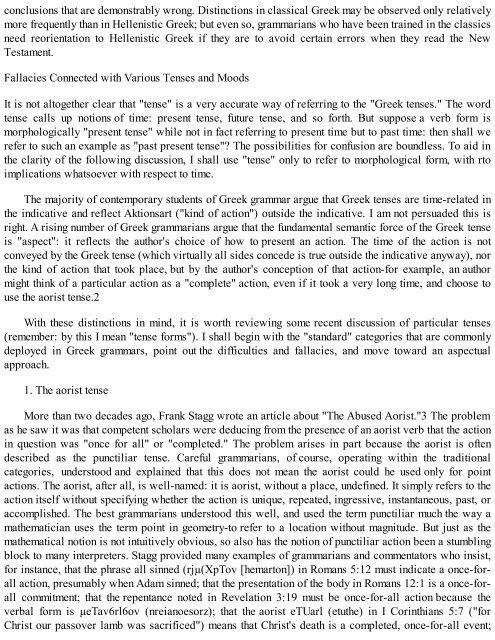Exegetical Fallacies - D. A. Carson
Exegetical Fallacies - D. A. Carson
Exegetical Fallacies - D. A. Carson
You also want an ePaper? Increase the reach of your titles
YUMPU automatically turns print PDFs into web optimized ePapers that Google loves.
conclusions that are demonstrably wrong. Distinctions in classical Greek may be observed only relatively<br />
more frequently than in Hellenistic Greek; but even so, grammarians who have been trained in the classics<br />
need reorientation to Hellenistic Greek if they are to avoid certain errors when they read the New<br />
Testament.<br />
<strong>Fallacies</strong> Connected with Various Tenses and Moods<br />
It is not altogether clear that "tense" is a very accurate way of referring to the "Greek tenses." The word<br />
tense calls up notions of time: present tense, future tense, and so forth. But suppose a verb form is<br />
morphologically "present tense" while not in fact referring to present time but to past time: then shall we<br />
refer to such an example as "past present tense"? The possibilities for confusion are boundless. To aid in<br />
the clarity of the following discussion, I shall use "tense" only to refer to morphological form, with rto<br />
implications whatsoever with respect to time.<br />
The majority of contemporary students of Greek grammar argue that Greek tenses are time-related in<br />
the indicative and reflect Aktionsart ("kind of action") outside the indicative. I am not persuaded this is<br />
right. A rising number of Greek grammarians argue that the fundamental semantic force of the Greek tense<br />
is "aspect": it reflects the author's choice of how to present an action. The time of the action is not<br />
conveyed by the Greek tense (which virtually all sides concede is true outside the indicative anyway), nor<br />
the kind of action that took place, but by the author's conception of that action-for example, an author<br />
might think of a particular action as a "complete" action, even if it took a very long time, and choose to<br />
use the aorist tense.2<br />
With these distinctions in mind, it is worth reviewing some recent discussion of particular tenses<br />
(remember: by this I mean "tense forms"). I shall begin with the "standard" categories that are commonly<br />
deployed in Greek grammars, point out the difficulties and fallacies, and move toward an aspectual<br />
approach.<br />
1. The aorist tense<br />
More than two decades ago, Frank Stagg wrote an article about "The Abused Aorist."3 The problem<br />
as he saw it was that competent scholars were deducing from the presence of an aorist verb that the action<br />
in question was "once for all" or "completed." The problem arises in part because the aorist is often<br />
described as the punctiliar tense. Careful grammarians, of course, operating within the traditional<br />
categories, understood and explained that this does not mean the aorist could he used only for point<br />
actions. The aorist, after all, is well-named: it is aorist, without a place, undefined. It simply refers to the<br />
action itself without specifying whether the action is unique, repeated, ingressive, instantaneous, past, or<br />
accomplished. The best grammarians understood this well, and used the term punctiliar much the way a<br />
mathematician uses the term point in geometry-to refer to a location without magnitude. But just as the<br />
mathematical notion is not intuitively obvious, so also has the notion of punctiliar action been a stumbling<br />
block to many interpreters. Stagg provided many examples of grammarians and commentators who insist,<br />
for instance, that the phrase all sinned (rjµ(XpTov [hemarton]) in Romans 5:12 must indicate a once-forall<br />
action, presumably when Adam sinned; that the presentation of the body in Romans 12:1 is a once-forall<br />
commitment; that the repentance noted in Revelation 3:19 must be once-for-all action because the<br />
verbal form is µeTav6rl6ov (nreianoesorz); that the aorist eTUarl (etuthe) in I Corinthians 5:7 ("for<br />
Christ our passover lamb was sacrificed") means that Christ's death is a completed, once-for-all event;



